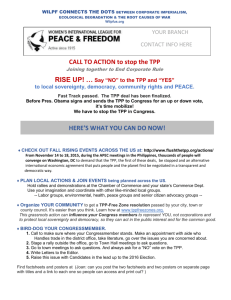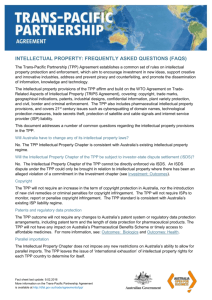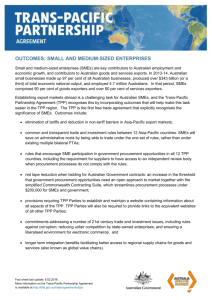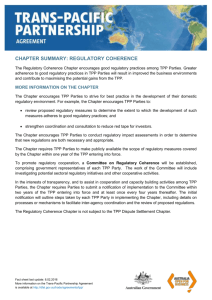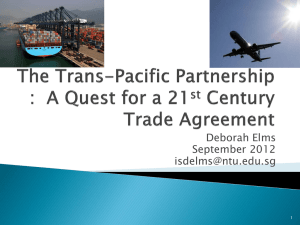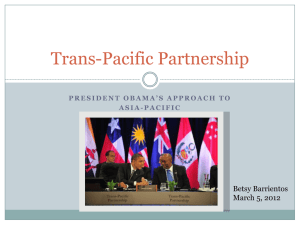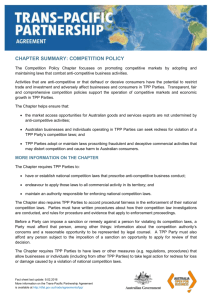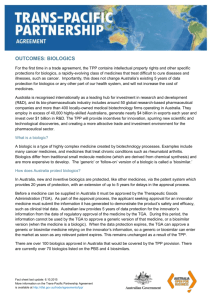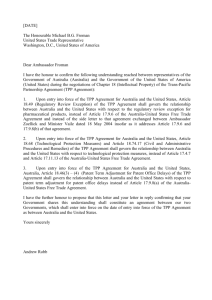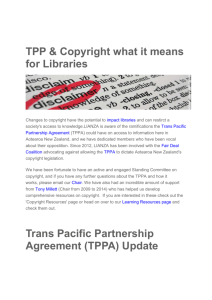outcomes: Health
advertisement
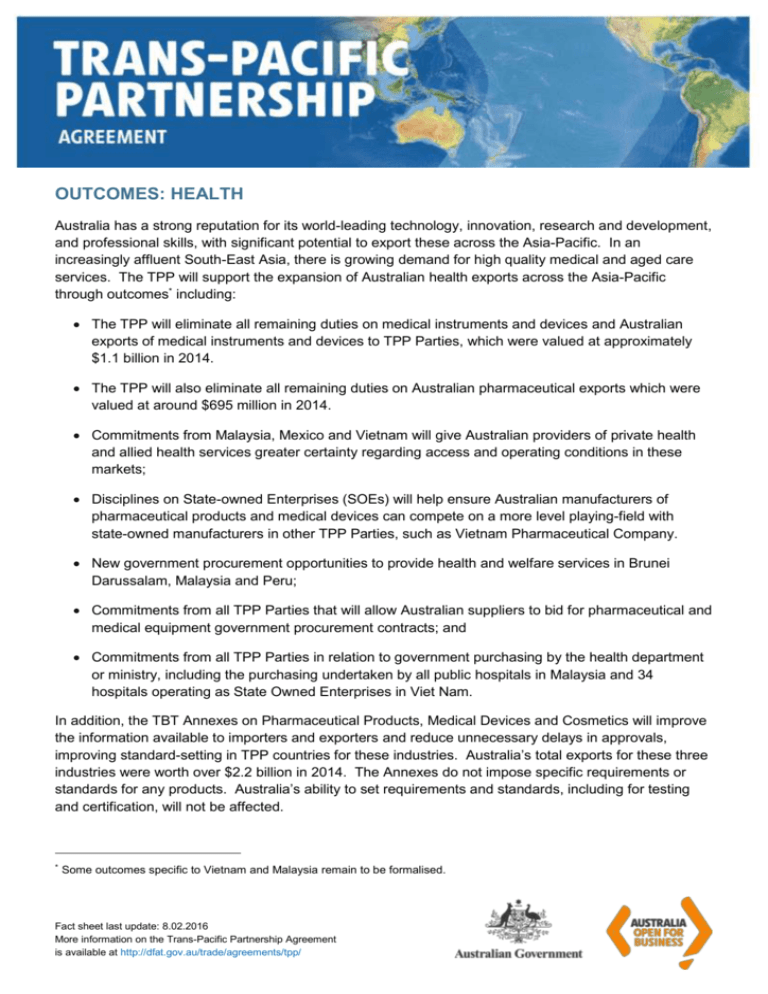
OUTCOMES: HEALTH Australia has a strong reputation for its world-leading technology, innovation, research and development, and professional skills, with significant potential to export these across the Asia-Pacific. In an increasingly affluent South-East Asia, there is growing demand for high quality medical and aged care services. The TPP will support the expansion of Australian health exports across the Asia-Pacific through outcomes* including: The TPP will eliminate all remaining duties on medical instruments and devices and Australian exports of medical instruments and devices to TPP Parties, which were valued at approximately $1.1 billion in 2014. The TPP will also eliminate all remaining duties on Australian pharmaceutical exports which were valued at around $695 million in 2014. Commitments from Malaysia, Mexico and Vietnam will give Australian providers of private health and allied health services greater certainty regarding access and operating conditions in these markets; Disciplines on State-owned Enterprises (SOEs) will help ensure Australian manufacturers of pharmaceutical products and medical devices can compete on a more level playing-field with state-owned manufacturers in other TPP Parties, such as Vietnam Pharmaceutical Company. New government procurement opportunities to provide health and welfare services in Brunei Darussalam, Malaysia and Peru; Commitments from all TPP Parties that will allow Australian suppliers to bid for pharmaceutical and medical equipment government procurement contracts; and Commitments from all TPP Parties in relation to government purchasing by the health department or ministry, including the purchasing undertaken by all public hospitals in Malaysia and 34 hospitals operating as State Owned Enterprises in Viet Nam. In addition, the TBT Annexes on Pharmaceutical Products, Medical Devices and Cosmetics will improve the information available to importers and exporters and reduce unnecessary delays in approvals, improving standard-setting in TPP countries for these industries. Australia’s total exports for these three industries were worth over $2.2 billion in 2014. The Annexes do not impose specific requirements or standards for any products. Australia’s ability to set requirements and standards, including for testing and certification, will not be affected. * Some outcomes specific to Vietnam and Malaysia remain to be formalised. Fact sheet last update: 8.02.2016 More information on the Trans-Pacific Partnership Agreement is available at http://dfat.gov.au/trade/agreements/tpp/ At Home The TPP is consistent with Australia’s existing health laws and policies. As a result, the Pharmaceutical Benefits Scheme will not be adversely affected and the price of medicines for Australians will not increase. Intellectual Property The TPP Intellectual Property Chapter strikes a balance between promoting medical innovation and investment, and supporting timely access to affordable medicines. It is consistent with Australia’s existing health and intellectual property laws and policies, including provisions protecting patents and regulatory data associated with pharmaceutical products. It will not require any changes to the Pharmaceutical Benefits Scheme. For the first time in a trade agreement, there will be specific protections for biologic medicines, a rapidlyevolving class of medicines that treat difficult to cure diseases and illnesses, such as cancer. For Australia, the TPP reaffirms our existing standard of 5 years of protection for the regulatory data required to be submitted to the Therapeutic Goods Administration (TGA) to demonstrate a biologic medicine’s safety and efficacy. Australia will meet this standard through existing laws and regulatory arrangements on data protection. This protection complements Australia’s patent system and other processes and systems that deliver the right balance between promoting innovation and providing timely and affordable access to medicines. Importantly, these provisions will have no impact on the PBS or the cost of medicines for consumers. Access to medicines in developing countries The Intellectual Property Chapter includes specific provisions that recognise challenges facing developing countries. The Chapter preserves flexibilities contained in the WTO Agreement on Trade-Related Aspects of Intellectual Property Rights (TRIPS) and the TRIPS Protocol. This includes compulsory licensing of patents. TPP countries also affirm their commitment to the Doha Declaration on TRIPS and Public Health, which supports least developed and developing countries address public health problems through enhanced access to medicines where they face insufficient or no manufacturing capacities in the pharmaceutical sector. Developing countries will benefit from transition mechanisms to help them implement the pharmaceutical intellectual property obligations in the TPP. These are based on capacity and development factors, and will provide adequate and appropriate transition periods for countries that need them. Annex on Transparency and Procedural Fairness for Pharmaceutical Products and Medical Devices The TPP Healthcare Transparency Annex includes provisions on transparency and procedural fairness for the listing of pharmaceuticals for reimbursement. These provisions are consistent with Australia’s existing procedures and will not require any changes to the Pharmaceutical Benefits Scheme. The Annex does not include commitments relating to the pricing of pharmaceuticals. The Annex is not subject to any form of dispute settlement, including ISDS. Fact sheet last update: 8.02.2016 More information on the Trans-Pacific Partnership Agreement is available at http://dfat.gov.au/trade/agreements/tpp/ 2 Investor-State Dispute Settlement (ISDS) The TPP ISDS mechanism includes a suite of provisions protecting the Australian Government’s ability to regulate for public health and other public interest objectives. For more information, refer to: Outcomes: Investment. Fact sheet last update: 8.02.2016 More information on the Trans-Pacific Partnership Agreement is available at http://dfat.gov.au/trade/agreements/tpp/ 3
